#1 Web Application Security Services (Trusted by 1000+ Teams)
We simulate real-world attacks using expert-led manual testing backed by continuous DAST. Each test aligns with OWASP ASVS/WSTG and API Top 10, while risks are prioritized through CVSS v4.0 and CISA KEV for faster, informed remediation.

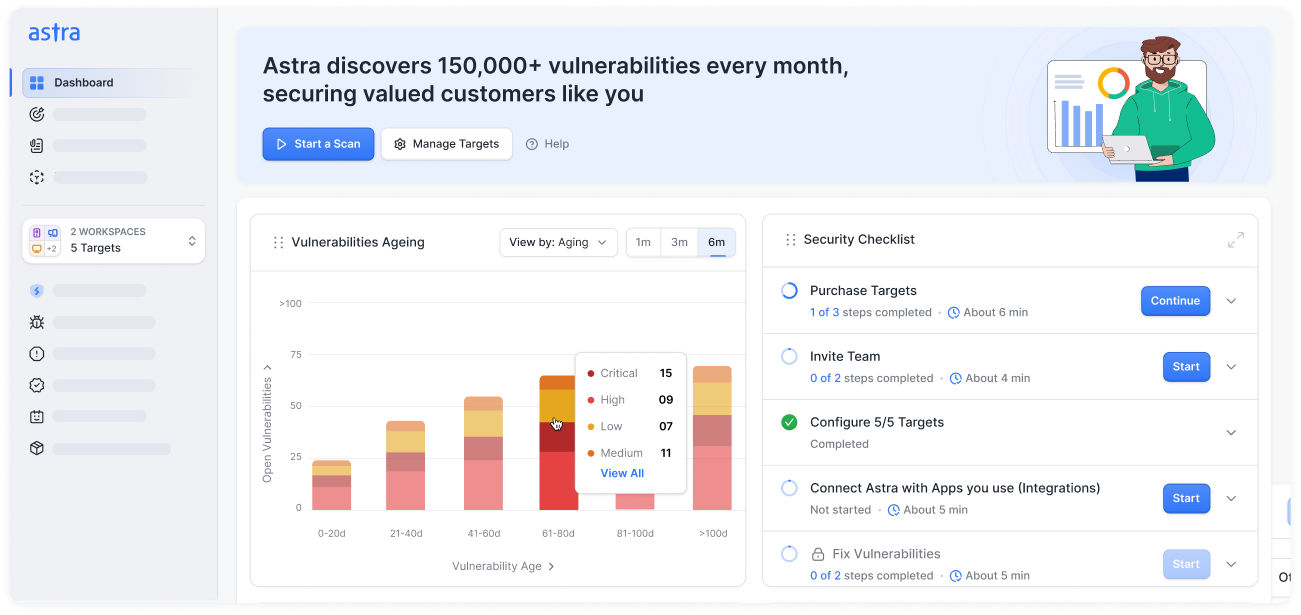










Why choose Astra Security's web application security services?
Experience our audit plans built for contemporary web application security and engineering teams with expert-driven testing, smart automation, and continuous protection at scale.
- Focus on real vulnerabilities with noise-free detection logic
- Our experts vet false positives so you don’t waste hours validating noise
- Mark verified issues once to skip them in future scans
- Get expert vulnerability reviews for faster prioritization
- Cut manual tuning as our AI-first web app vulnerability scanner adapts tests to your app
- Context-aware analysis improves accuracy & guidance with every scan
- Use machine learning models that evolve from real-world exploit data
- Scale testing without increasing security headcount
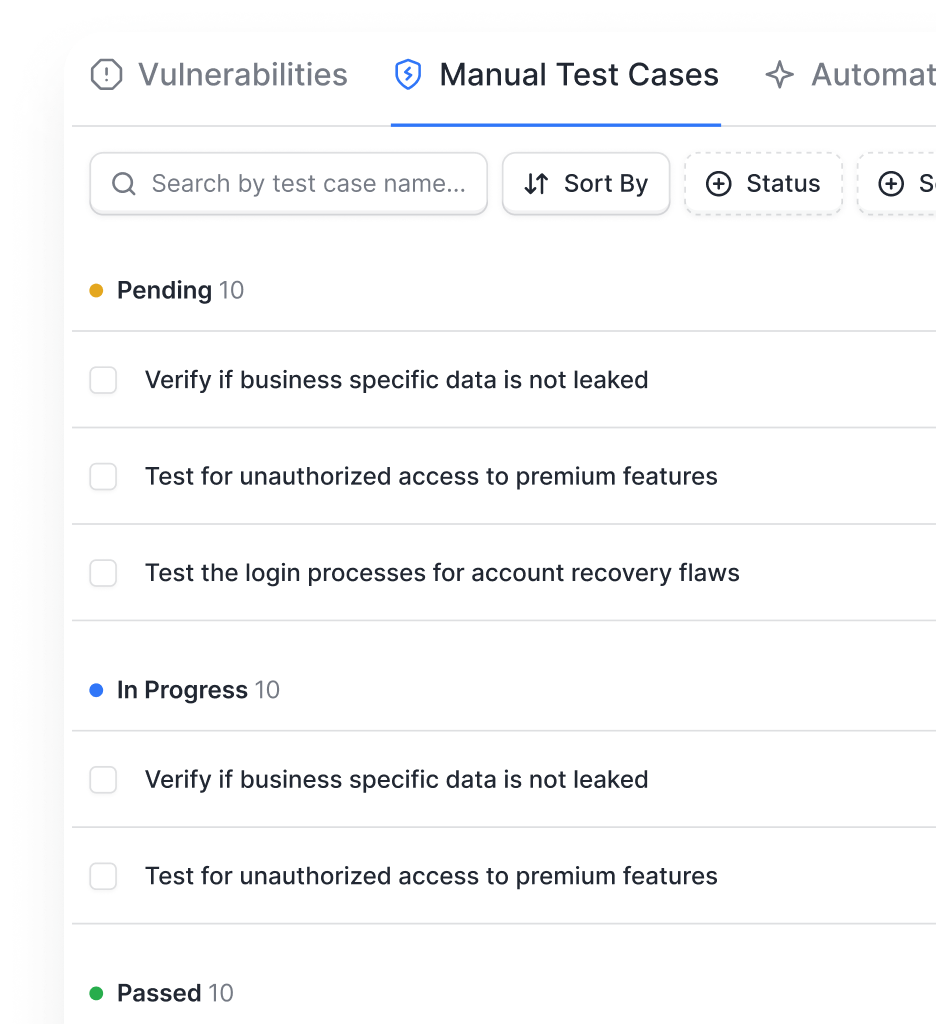
- Get continuous protection across web, API, and cloud
- Avoid alert fatigue with business-impact optimized vulnerabilities & expert-tuned DAST scans
- Stay compliant with automated reports, verified fixes, and targeted automated rescans
- Cut false positives and reduce total cost with managed accuracy pentests
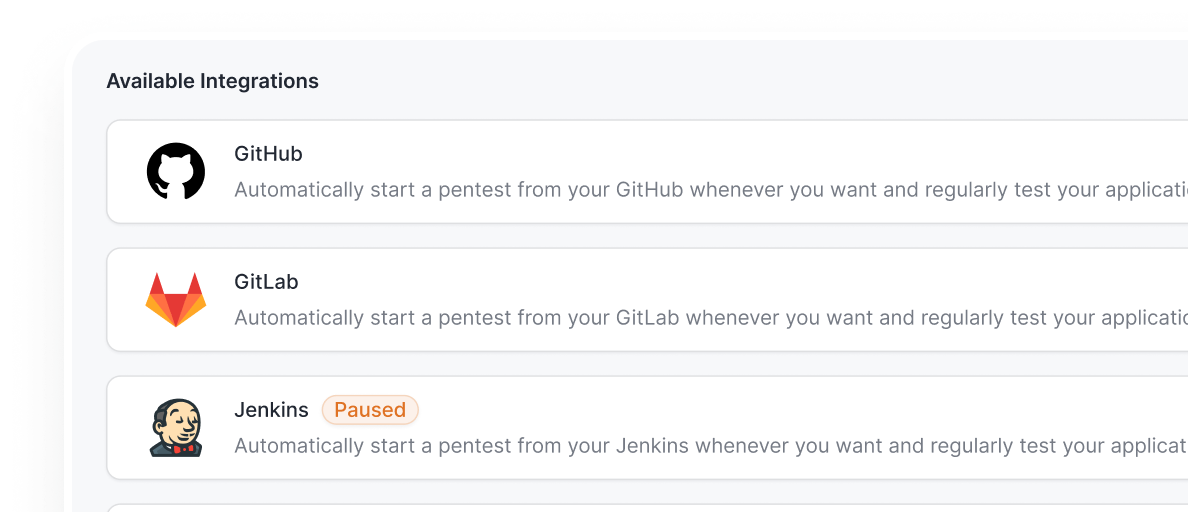
- Integrate testing seamlessly into your CI/CD workflows (GitHub, GitLab, CI, Jenkins, Bitbucket, & more) with zero release delays
- Automate scans, Slack vulnerability alerts, and JIRA ticketing to cut manual work
- Shorten your mean time to remediate with seamless vulnerability workflows
- Maintain speed-to-market without compromising security
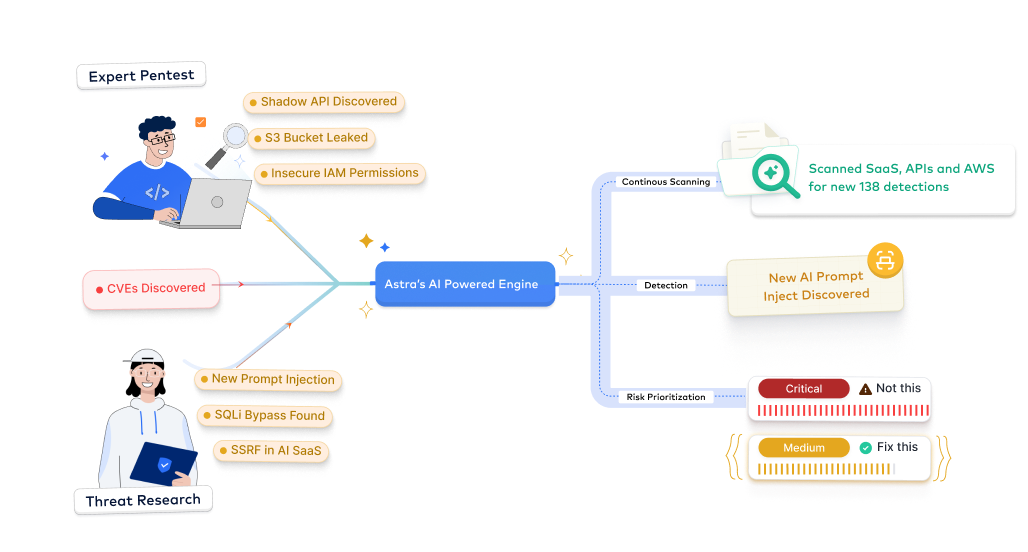
- Generate audit-ready reports for ISO, PCI, SOC 2, HIPAA, GDPR, OWASP, NIST, and more
- Accelerate certification with simplified expert-led guidance with a dedicated Trust Center
- Demonstrate security maturity to shorten sales cycles
- Turn compliance readiness into a sales advantage

Simulate real-world attacks, uncover hidden risks, and strengthen your defenses with expert-led web application security audit services for just $5,999.
Start TrialAstra's 7-Step Pentest Process
How our web application security assessment services work?
Learn how our team delivers smarter protection through expert-led vulnerability assessments, pentests, and audits.
Discovery & Scoping
- Identify all in-scope web applications, APIs, cloud infras, domains, and subdomains for testing.
- Define parameters, environments, and integrations to ensure complete coverage.
- Align the assessment scope with relevant compliance frameworks such as PCI DSS, ISO 27001, SOC 2, or HIPAA.
- Personalized setup to maintain visibility throughout the engagement.
Outcome: Outline a mutually-agreed compliance-guaranteed scope and a clear roadmap to audit readiness.


Authentication Setup
- Establish secure authentication workflows for behind-login testing across user roles, APIs, and SSO flows.
- Integrate credentials, tokens, and session configurations to enable deep authenticated coverage.
- Ensure safe testing within staging or production replicas without disrupting business operations.
- Standardized authentication templates for future tests to streamline recurring assessments.
Outcome: Get full-depth testing coverage without risking business downtime or continuity.
Automated Baseline
- Run continuous automated scans across your web app(s), including APIs consumed and cloud to detect OWASP Top 10, CVEs, business logic flaws, and misconfigs
- Leverage Astra Security’s tuned detection engine for comprehensive baseline coverage, automated cloud security config review (AWS/GCP/Azure), and minimized false positives
- Correlate automated findings with prior assessments to maintain historical visibility
- Deliver continuous monitoring data supporting ongoing compliance & audit preparation
Outcome: Gain a comprehensive, continuous threat baseline ready for immediate action and audit reporting.


Manual Pentest & Risk Scoring
- Our experts exploit post-scan findings with AI test cases to validate chaining, impact, create PoCs, and offer prioritized fixes.
- Evaluate each web app & consumed API finding based on exploitability, business impact, and compliance relevance
- Apply contextual CVSS scoring to prioritize remediation per organizational risk appetite, certifications, or regulatory exposure
- Generate clear risk summaries to guide both technical and executive decision-making
Outcome: Receive prioritized, actionable risk intelligence focused on business & regulatory exposure.
Remediation Support
- Deliver detailed, developer-focused remediation steps validated by our expert pentesters
- Provide reproducible PoCs, payloads, and configuration guidance for faster fixes
- Collaborate directly with your engineering team to verify patch effectiveness
- Get documented remediation evidence aligned with audit and compliance requirements.
Outcome: Achieve faster, verified fixes supported by our team and documented for full compliance.


Re-Scan & Validate
- Conduct targeted re-tests to confirm successful remediation and eliminate residual risks.
- Schedule recurring scans to detect regressions after updates or infrastructure changes.
- Capture time-stamped validation evidence for audit readiness and certification renewals.
- Maintain a verified security baseline that demonstrates continuous improvement over time.
Outcome: Secure a certified, publicly verifiable certificate proving continuous security for all stakeholders.
From startups to fortune companies,
1000+ companies trust Astra












































.webp)





Experience zero false positives and seamless integrations with Astra’s web application security services.
Request Pentesting ServicesTypes of penetration testing services
Explore our full suite of web application security services designed for every layer of your security stack.

Dynamic Application Security Testing (DAST)
- Simulate real-world attacks using Astra Security’s intelligent web app scanner
- Identify OWASP Top 10, CWE, and SANS 25 vulnerabilities that surface only during runtime
- Compliance Mapping: PCI DSS, ISO 27001, SOC 2, GDPR, HIPAA, and more

Manual Pentesting
- Engage expert pentesters to find business logic flaws, chained exploits, and overlooked vulnerabilities
- Includes automated cloud configuration reviews (AWS, GCP, Azure) and in-depth API pentests within your target environment
- Prioritize remediation with compliance and business impact mapped vulnerabilities

Black Box Penetration Testing
- Replicate real-world hacker tactics to evaluate external resilience with zero internal visibility
- Gain insights into exploitable entry points and data exposure risks

White Box Penetration Testing
- Analyze source code, configurations, and logic paths with full internal access
- Detect deep-seated security flaws and vulnerabilities before attackers do

Gray Box Penetration Testing
- Combine external simulation with limited internal access for targeted coverage
- Identify vulnerabilities with higher context and risk relevance
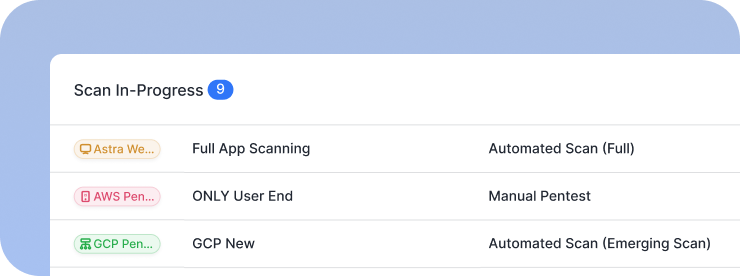
Continuous Monitoring
- Track emerging CVEs, validate patches, and monitor security posture across updates
- Receive real-time alerts, continuous scans, and expert validation to stay compliant
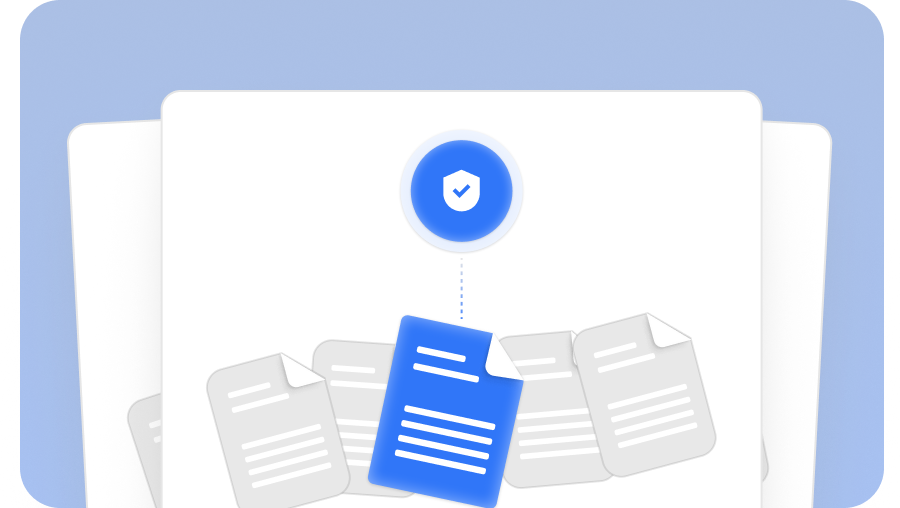




Secure every layer of your web application with Astra Security’s expert-led testing.
Book a DemoAstra Security vs traditional vendors
See how our modern approach to web application pentesting services outpaces traditional vendor models.
Experience the Astra Security difference: faster, smarter, compliance-ready pentesting.
Pentesting as a service, tailored for your industry
Continuous penetration testing and compliance mapping services built for ISO, SOC 2, HIPAA, PCI DSS, and more.

- Secure financial systems and payment workflows from logic flaws
- Deliver actionable fixes and maintain PCI DSS, ISO 27001, SOC 2, DORA compliance, and more
- Standards: OWASP, PTES, CVSS

- Protect patient data and secure APIs across web, mobile, and cloud
- Uncover hidden PHI exposures and validate HIPAA, ABHA, and more
- Standards: OWASP, PTES, NIST, CVSS

- Accelerate app security with DevSecOps integration and continuous scans
- Detect vulnerabilities with AI-driven validation and ensure ISO 27001, SOC 2, GDPR compliance and more
- Standards: OWASP, PTES, CVSS, NIST SP 800-115

- Protect customer data and secure payment flows from BOLA/IDOR risks
- Empower developers with guided remediation and PCI DSS, ISO 27001, SOC 2 compliance and more
- Standards: OWASP, PTES, CVSS

- Fortify cloud, container, and on-prem systems with authenticated tests
- Monitor and validate vulnerabilities to prevent downtime; comply with NIST, ISO 27001, SOC 2, CREST, Cert-In, and more
- Standards: OWASP, PTES, NIST, CVSS

- Discover shadow APIs and secure cloud services
- Deliver fast, developer-friendly fixes; ensure GDPR, ISO 27001, SOC 2 compliance
- Standards: OWASP, PTES, CVSS
Simulate real-world attacks, uncover hidden risks, and strengthen your defenses with expert-led web application security audit services for just $5,999.
Start TrialOur pentesters? World class, certified & contributors to top security projects
We find the bugs before the bad guys do
Our team stays ahead of the curve in the ever-evolving world of web security

.avif)
.avif)
.avif)




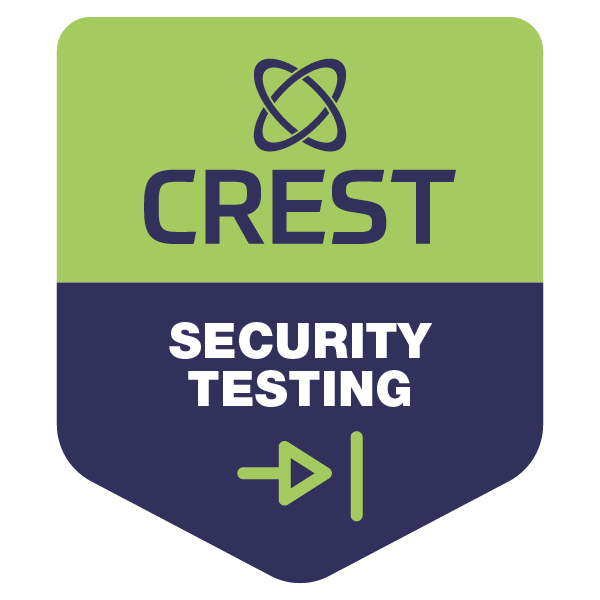
Stay compliant throughout the year
Understand our industry-specific pentests as a service plans designed to meet your compliance, scale, and security needs.
- Get compliance-ready year-round for ISO 27001, SOC 2, GDPR, HIPAA, PCI DSS, CREST, CERT-In, CIS Controls, NIST, & more
- Receive actionable insights from continuous pentesting and expert-led remediation guidance
- Track compliance progress with the Astra Security Compliance View, providing executive-friendly and technical views

- Scan continuously for new CVEs, OWASP Top 10, SANS Top 25, PTES standards, and consumed API-specific risks
- Identify and remediate vulnerabilities in real time through automated scans, regression testing, and expert validation
- Monitor your attack surface dynamically with the Astra Security Vulnerability View, showing trends, risk scores, and remediation status

- Maintain audit-ready reports without manual effort
- Reduce risk exposure with real-time detection and validation
- Prioritize remediation based on business impact and compliance requirements
- Demonstrate security maturity to clients, regulators, and internal stakeholders


Frequently asked questions
What are web application security services?
Web application security testing focuses on identifying vulnerabilities specific to web apps, such as injection flaws or session issues, while general app security encompasses broader protections, including mobile and desktop applications and backend systems.
What is included in web application security services?
Astra Security's web application security services include vulnerability scanning, manual penetration testing, authentication and access checks, configuration reviews, and business logic testing. You also receive detailed risk reports, remediation guidance, and verification scans to ensure your fixes are effective.
Why is web application security important?
Web app security audits help prevent data breaches, downtime, and compliance failures caused by unpatched vulnerabilities, alongside helping your team protect customer data, maintain business continuity, and preserve your brand’s reputation in an increasingly attack-prone digital landscape.
What methods do you use to assess my application’s security?
Our gray-box pentests combine automated scanners, manual penetration testing, and AI-driven vulnerability analysis to uncover both technical and logic flaws. Each finding is manually verified to ensure accuracy and mapped to real business impact under vetted scans.
How often should I test my web application? Will I get a report after the assessment?
Automated vulnerability scans should run continuously or at least weekly to detect new risks early. Comprehensive penetration tests are recommended annually or after major releases, code changes, or infrastructure upgrades to validate overall security and maintain compliance.
Can you help fix the vulnerabilities found?
Absolutely. Our security experts provide clear remediation steps, developer support, and validation rescans to confirm fixes. This ensures your application not only passes assessments but also stays secure after vulnerabilities are patched.











